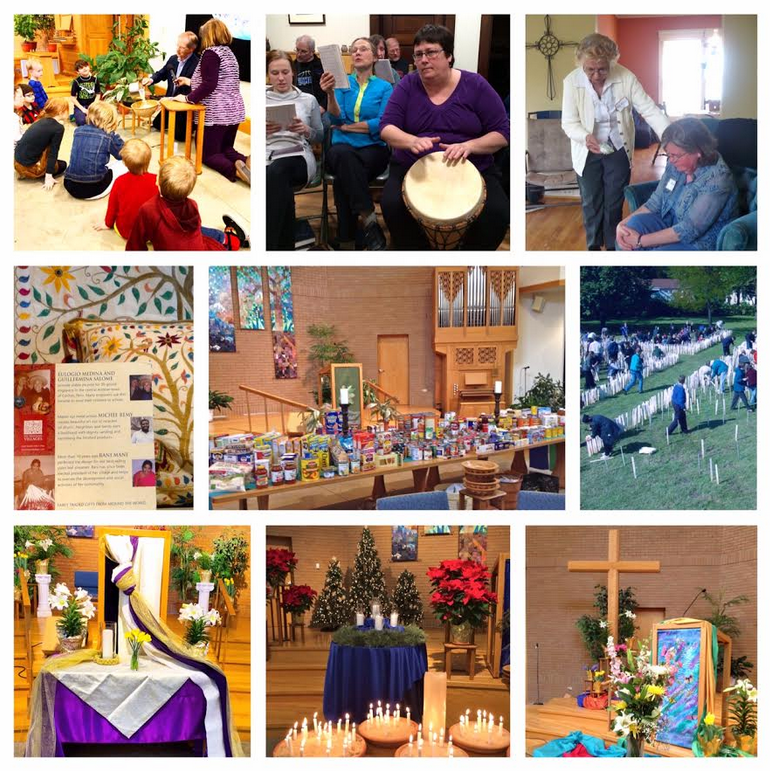Glimpses of Healing and Hope
October 23, 2017
By Jane Bishop Halteman

The evangelical tradition focuses on the proclamation of good news, missional outreach, and the centrality of Scripture
As guest preacher Sunday, KRMCer Josh shared from his growing-up experience in the evangelical tradition, one of the six streams of faith Kern Roaders have learned about in our current worship series.
Recognized by Streams of Living Water author Richard Foster as the Word-centered life, a life founded on the living Word of God, the written Word of God, and the proclaimed Word of God, “The evangelical tradition is comprised of three great themes: first, and foremost, the faithful proclamation of the gospel; second, the centrality of Scripture as a faithful repository of the gospel; and third, the confessional witness of the early Christian community as a faithful interpretation of the gospel,” Foster goes on to say at the Renovare website.
Josh began his sermon by mentioning three things that the evangelical tradition is not…it is not limited to individual, personal salvation; it is not about just a literal reading of scripture, and it is not only about winning souls for Jesus, he said.
The gospel has to do with the proclamation of good news, according to Josh, though somehow in some places, the evangelical tradition has become a message of individual salvation with an emphasis on getting into heaven…a narrow view, he said, adding that the good news is more about liberation from oppression or captivity or blindness, usually aimed at the poor, the marginalized, the downtrodden.
The good news has many dimensions, he noted, including the individual dimension to be sure, but also political and economic dimensions by which a kingdom/community might be freed from systems of injustice and concerns in the here and now, as well as the future.
A literal view of scripture may bring with it a presumption, Josh said, that lends itself to black and white beliefs. “Jesus shows us how to read Scripture with an eye to new possibilities of understanding,” he offered. Jesus, rather than Scripture itself, is the absolute authority. “We have to read the Scripture individually and communally through the lens of Christ with the aid of the Spirit,” he suggested, pointing out that “words take on added nuance as the Spirit intercedes. A rigid view of Scripture can lead to divisions over essentials and nonessentials.”
Noting that Jesus responded to both physical and spiritual needs, Josh said that the evangelical tradition’s emphasis on missionary activity may sometimes leave physical needs unmet. Noting that Jesus’ healings sometimes led to relief from fever or to standing up and praising, Josh explained that conversion can come in a variety of ways, both physical and spiritual.
The good news, he said, is about liberation, about a deep and rich exploration of Scripture, and about responding to the needs of others…the evangelical tradition is, indeed, an important stream in Christian history.
The Renovare site poses it this way: “As I think about the divinity and humanity of Scripture, I am challenged by this question: What if, instead of reading the Bible, I let it read me? What if I focused less on getting all the way through the Bible each year and more on allowing the good news about life in the Kingdom to get all the way through me, to soak down deep, saturating my soul? (Then) I discover the best news of all. Jesus is alive, immediate, present, and available to teach us how to enjoy life in his kingdom, here and now.”
Referencing the evangelical tradition as the “Word-Centered Life ” or “Living the life-giving message,” the Renovare site says the “tradition encompasses much more than simply converting people. The evangel–the ‘good news’–is God’s great message to humanity: that all can be redeemed and restored to its intended design. This is the message embodied in Jesus himself, rooted in the word of God, and ultimately expressed through the lives of those who follow Christ. It is a living tale of grace spoken in and through word and action.”
Some of the words and actions Kern has participated in include (top row of above photo collage) teaching our children, singing and praising, retreating and praying; (second row) outreach via our Ten Thousand Villages store, local food pantry collection, 2001 response to 9/11 (at a suburban Chicago church); and (third row) our worship visuals proclaiming Christmas and Easter good news. How have you been part of circulating the good news?
